ReadMe/LeesMij
25 September 2025 - 28 May 2026
If a book could talk, it would call out Read Me. But without a mouth, it is difficult to speak. That is why passionate researchers and professional bookworms from our Faculty of Arts lend their voices to a book that they believe says Read Me.
Read Me is a reading group set up in 2018 by doctoral students in literature at the University of Antwerp (Literandi), in collaboration with bookshop De Groene Waterman.
Once a month, a doctoral student facilitates a discussion between enthusiastic readers about a book of their choice.
Below, you can find the schedule for the upcoming year.
Practical Information
Where: De Groene Waterman - Wolstraat 7, 2000 Antwerp
Each session starts at 17:30 pm and takes around two hours.
Participation is free. Monetary contributions are appreciated but remain completely voluntary.
Please register by sending an e-mail to groenewaterman@groenewaterman.be
25/9/2025: hosted by Philippe Vanhoof - Clarice Lispector, The Passion According the G.H.
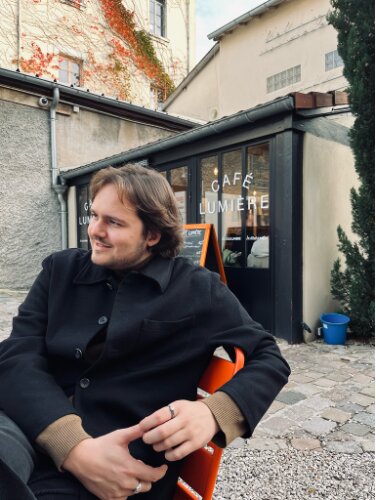
Philippe Vanhoof is a Graduate Teaching and Research Assistant of Translation Studies at the French section of the Department of Translators and Interpreters at the University of Antwerp and a member of the TricS research group (Translation, Interpreting and Intercultural Studies). His research intersects with pornographic literature in translation, (transgressive) translational stylistics, philosophy of translation and critical (translation) theory, complexity thinking and the ideological, translational and transcultural dimensions of intellectual and sexual history. Every now and then, he translates prose and poetry from French, English and Russian – for fun mostly.
With A paixão segundo G.H. (1964), Ukraine-born Brazilian author Clarice Lispector interrogates the meaning of life in its purest form: a seemingly mundane event disrupts the usual course of daily life and causes a devastating existential upheaval. After killing a cockroach in her maid’s extremely tidy room, artist G. H. plunges into an existential crisis, which Lispector translates into a stream of consciousness on language, life and faith. Through mystical elements, the reader is confronted with the disturbed relationship between language, meaning and intense emotion. To what extent does language give meaning to our life? Can all emotion be expressed in language? Is language more of a cage to thought? The English translation by American poet Idra Novey, The Passion According to G.H. (2012), features a brief translator’s note, in which Novey illustrates some translational choices. As Clarice Lispector states at the beginning of her book: “This book is like any other book. But I would be happy if it were only read by people whose souls are already formed.”
30/10/2025: hosted by Paavo Van der Eecken - Max Porter, Grief is the Thing With Feathers
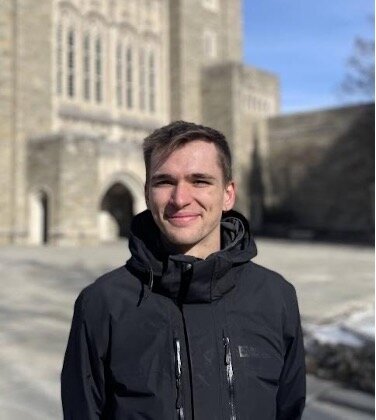
Paavo Van der Eecken is a PhD candidate in literature and digital humanities at Ghent University and University of Antwerp. In his dissertation he studies historical illustrated children’s literature.
“Moving on, as a concept, is for stupid people, because any sensible person knows grief is a long-term project.”
In this session of the ReadMe initiative, we will take notes from Grief is the Thing with Feathers. In doing so, we will approach this session as we would approach grieving: we will refuse to rush or slow the process and refrain from attempts to fix. Instead, we will create a safe environment to discuss the ever-changing nature of grief, and the literary shapes it can take. We will see how grief can be a crow, but also how it can be so much more than that.
11/12/2025: hosted by Sanne Hermans - W.F. Hermans, Beyond Sleep

Sanne Hermans is a PhD candidate at the Centre for Urban History at the University of Antwerp. She is currently in the final year of her research on future thinking and action in the early modern period. In addition to History, she holds a Bachelor's and Master’s degree in Dutch Language and Culture from the Universities of Groningen and Amsterdam. During her undergraduate studies, she developed leeswijzers for Stichting Senia, creating reading guides for book clubs across the Netherlands. She also worked as a publishing assistant at Uitgeverij Verloren, specialising in Dutch history.
The post-war novel Nooit meer slapen (Beyond Sleep, 1966) by W.F. Hermans is widely regarded as a masterpiece of Dutch literature. It follows Alfred Issendorf, a young geologist, on a field expedition through the remote wilderness of northern Norway, as he attempts to prove a scientific theory and gain academic recognition. But as the journey grows increasingly gruelling, Alfred is forced to confront not only the harsh landscape but also his fears and insecurities, turning the expedition into an existential ordeal. The novel was awarded the Vijverberg Prize in 1966, though Hermans declined to accept it. Nooit meer slapen has since been translated into Norwegian, Swedish, German, Spanish, and English.
29/1/2026: hosted by Lore Goossens - Richard Marsh, The Beetle
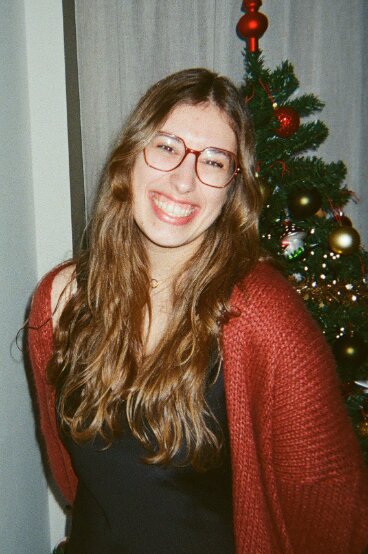
Is a beetle the ultimate horror figure, even scarier than a vampire? In 1897, Victorian readers definitely thought so. The Beetle is a bizarre and intriguing novel with a strange premise: the main characters are haunted by a supernatural figure that can transform into a beetle. Richard Marsh’s The Beetle is now a bit of an obscure Gothic novel, but at the time of its release, it even outsold Bram Stoker’s Dracula. As an extremely popular horror novel, it explores the fears and anxieties of the Victorians, surrounding gender, sexuality and imperialism. In this bookclub session, I want to look at the Beetle through a contemporary lens, to see if the novel still holds its own today. Do we still find the beetle scary?
Hi, I’m Lore and I’m intrigued by all books that are popular and pulpy, from romance to fantasy. I strongly believe that we should read more “bad” books, that they broaden our view not only on literature but also on the world itself. I’m a PhD student at the University of Antwerp, where I specialize in young adult literature and fairy-tale retellings. During the day, I read about transforming adolescents and contemporary beasts, so I’m very excited to look at a weird Victorian monster with you!
26/2/2026: hosted by Camille Bortier - Simone de Beauvoir, La Femme Rompue, The Woman Destroyed
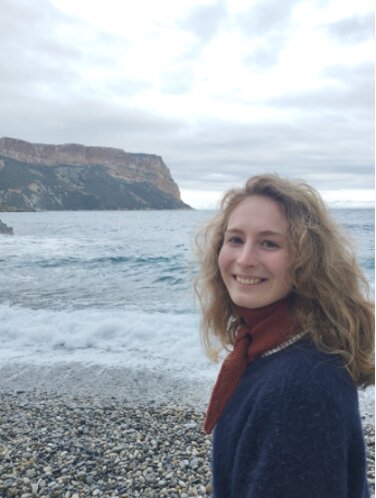
Camille Bortier is a PhD candidate in French literature. For one of the chapters of her dissertation, she explores, through a method of creative writing, the exchange of letters that might have existed between Simone de Beauvoir and Marguerite Duras. For this session of the ReadMe book club, she proposes to discuss de Beauvoir’s The Woman Destroyed, which has recently seen a noticeable renewal in popularity. First published in 1967, the book consists of three short stories that each offer a portrait of a different woman.
26/3/2026: hosted by Megan Briggs - Anne Carson, Autobiography of Red

In Autobiography of Red: A Novel in Verse (1998), Canadian poet and Classics scholar Anne Carson recasts the Greek myth of Geryon and the Tenth Labor of Herakles in modern time. Steischoros' tale of Herakles slaying the red-winged monster Geryon transforms into an epic-length free verse poem on desire and a damaging young love affair between the sensitive teenage Geryon and the hard-edged Herakles. Carson's genre-bending poeticism and irreverent scholarship is unlike anything you've read before—while taking up the age-old themes of love and human failure.
Megan Briggs is a former Fulbright English Teaching Assistant at the University of Antwerp, and is now pursuing a Master of Cultural Studies at KU Leuven. They come from the U.S. and previously studied Ethnicity, Race & Migration at Yale University.
30/4/2026: hosted by Maureen Hosay - Rebecca Makkai, I Have Some Questions for You
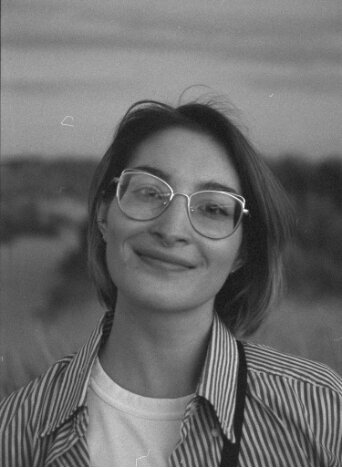
Maureen Hosay is a PhD researcher in Literature and Translation Studies at the University of Antwerp and Ghent University. Her thesis deals with the translation of multimodal children’s literature. She is hobby collector and an avid fiction reader of mystery novels, contemporary fiction, and has a soft spot for experimental literature.
Film professor and podcaster Bodie Kane thought her boarding school years and the murder of her roommate were firmly behind her. That is, until she is invited to return to Granby school to teach a course, and the pull of the mystery becomes to great to resist. The case may be closed but Bodie grows increasingly suspicious as she reviews the evidence. Could this story have a different ending? Is she prepared to do what it takes to find out?
I Have Some Question for You is a true crime fiction novel that navigates the divide between the public’s – at times shameless – fascination for true crime and the real, far-reaching impact of a murder on a community. If you like Eliza Clark’s Penance, Jessica Knoll’s Bright Young Women, or Girl in Snow by Danya Kukafka, or if you are generally interested in true crime, I Have Some Questions for You may be your next read.
28/5/2026: hosted by Nooshin Shahidzadeh Asadi - W.G. Sebald, Austerlitz
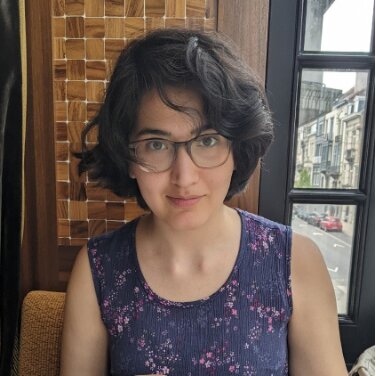
Nooshin Asadi is a PhD candidate at the University of Antwerp where she works on developing digital tools for literary research. She likes reading books if they are not assigned to her.
Austerlitz, the final and best-known novel of the German author W. G. Sebald, is like most of his oeuvre defiant of a traditional categorization. It is a novel masquerading as a biography, rife with eclectic photographs that—more often than not—deliberately don’t belong to what’s being described. A masterful blending of fact an fiction, the book starts at the Antwerp Central Station and takes the reader on a melancholic journey through Europe and through half-remembered memories of a man in search of his past.